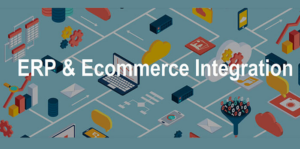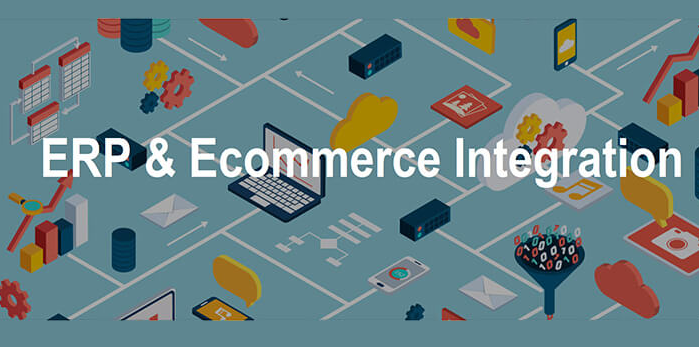Introduction to ERP in E-commerce

In the fast-paced world of e-commerce, businesses are constantly seeking ways to optimize their operations, enhance customer experiences, and stay ahead of the competition. One powerful tool that has emerged to address these challenges is Enterprise Resource Planning (ERP) systems. This article explores the significance of ERP in the e-commerce landscape, its benefits, challenges, and how to implement it successfully.
The Benefits of Implementing ERP in E-commerce
In the ever-evolving world of e-commerce, businesses are constantly seeking ways to gain a competitive edge. One powerful tool that has emerged to address these challenges is Enterprise Resource Planning (ERP) systems. Let’s delve into the significant benefits of implementing ERP in the e-commerce landscape:
Streamlining Operations
Efficiency is the cornerstone of e-commerce success. ERP systems offer a comprehensive solution to streamline operations by integrating and automating various business processes. This integration allows businesses to manage everything from inventory to order processing seamlessly. As a result, manual errors are minimized, and productivity soars. E-commerce businesses can handle large volumes of orders and data with ease, ensuring that customers receive the right products on time.
Enhanced Customer Experience
In the e-commerce world, customer satisfaction is paramount. ERP systems provide real-time access to data, ensuring that order tracking and customer support are timely and accurate. With accurate information at their fingertips, e-commerce businesses can respond to customer inquiries swiftly, provide accurate delivery times, and offer personalized experiences. This enhanced level of service leads to happier customers and, ultimately, increased customer retention.
Data Accuracy
Inaccurate data can lead to costly mistakes in e-commerce. It’s essential to have precise and up-to-date information at all times. ERP systems centralize data, reducing the risk of errors and ensuring that information remains consistent across the organization. From inventory levels to customer data, having accurate and reliable information is invaluable for making informed business decisions and maintaining trust with customers.
Challenges of ERP Integration in E-commerce
While the implementation of Enterprise Resource Planning (ERP) systems in e-commerce offers significant advantages, it also presents several challenges that businesses must navigate. Let’s explore the key challenges associated with ERP integration in the e-commerce sector:
Integration Complexity
Integrating an ERP system with existing e-commerce platforms can be a complex and intricate process. E-commerce businesses often have a multitude of software tools and systems in place to manage various aspects of their operations, including inventory management, order processing, customer relationship management, and more. Coordinating the seamless flow of data between these systems and the ERP solution can be challenging. It requires meticulous planning, skilled IT professionals, and a clear understanding of the business’s unique requirements.
Cost Considerations
ERP implementation can be a substantial financial commitment for e-commerce businesses. Costs associated with ERP integration include software licenses, hardware, consulting fees, employee training, and ongoing maintenance expenses. While larger enterprises may have the financial resources to absorb these costs, small and mid-sized e-commerce businesses may need to carefully evaluate the return on investment (ROI) and budget accordingly. Balancing the potential benefits of ERP with the costs is a critical consideration in the integration process.
Resistance to Change
One of the most significant challenges in ERP integration is the resistance to change from employees within the organization. People are often accustomed to their existing workflows and systems, and introducing a new ERP system can disrupt established routines. E-commerce businesses must invest in effective change management strategies, including thorough training and communication, to help employees adapt to the new system. Gaining buy-in from employees and addressing their concerns is crucial to the success of ERP integration.
ERP Systems Suitable for E-commerce
Selecting the right Enterprise Resource Planning (ERP) system is crucial for the success of e-commerce businesses. The choice of ERP software should align with the unique needs and requirements of the e-commerce sector. Let’s explore some of the ERP systems that have proven to be suitable for e-commerce businesses:
SAP
SAP is a widely recognized name in the world of ERP. This comprehensive software suite offers a wide range of tools that cater to the specific needs of e-commerce enterprises. SAP’s capabilities extend to areas such as inventory management, order processing, customer relationship management (CRM), and analytics. It provides e-commerce businesses with the tools they need to streamline their operations and make informed decisions.
Oracle
Oracle is known for its scalability and reliability, making it an appealing choice for large and growing e-commerce businesses. Oracle’s ERP solutions offer robust features for managing complex supply chains and optimizing operations. E-commerce companies that deal with substantial transaction volumes can benefit from Oracle’s ability to handle data at scale.
NetSuite
NetSuite is a cloud-based ERP solution that has gained popularity among e-commerce businesses, particularly smaller and growing enterprises. It provides a unified platform for financials, e-commerce, CRM, and inventory management. NetSuite’s flexibility and scalability make it an ideal choice for e-commerce businesses looking to expand without the burden of managing on-premises hardware and software.
Microsoft Dynamics 365
Microsoft Dynamics 365 offers comprehensive ERP and Customer Relationship Management (CRM) capabilities, making it a suitable choice for e-commerce businesses seeking an integrated solution. It can help e-commerce companies effectively manage their operations, sales, and customer interactions. The platform’s familiar Microsoft interface can ease the transition for employees already accustomed to Microsoft products.
Key Features to Look for in an ERP System
Choosing the right Enterprise Resource Planning (ERP) system for your e-commerce business is a critical decision. To make an informed choice, it’s essential to consider the key features that will best align with your business needs. Here are the essential features to look for in an ERP system for e-commerce:
Inventory Management
Efficient inventory management is fundamental for e-commerce businesses. Look for an ERP system that offers robust inventory management features. This includes real-time tracking of stock levels, order management, and the ability to forecast demand accurately. Effective inventory management helps prevent overstocking, understocking, and ensures that products are readily available to meet customer demands.
Order Processing
Streamlining order processing is crucial for e-commerce efficiency. An ideal ERP system should automate order fulfillment processes. It should support everything from order entry to order tracking and returns processing. This reduces the chances of errors and ensures timely deliveries, leading to improved customer satisfaction.
Customer Relationship Management (CRM)
E-commerce success hinges on maintaining strong customer relationships. An ERP system that includes CRM capabilities can help e-commerce businesses manage customer data, interactions, and insights. It enables personalized marketing, better customer support, and tailored recommendations, ultimately enhancing the customer experience.
Analytics and Reporting
Informed decision-making relies on access to data and insights. An ERP system should offer robust analytics and reporting features. It should allow you to generate customized reports, track key performance indicators (KPIs), and gain insights into sales trends, customer behavior, and inventory performance. This data-driven approach empowers e-commerce businesses to make strategic decisions and continuously improve their operations.
Implementing ERP in E-commerce: Step by Step
Implementing an Enterprise Resource Planning (ERP) system in an e-commerce environment is a significant undertaking that requires careful planning and execution. To ensure a successful integration, follow these step-by-step guidelines:
1. Needs Assessment
The first step in implementing ERP in e-commerce is to conduct a thorough needs assessment. This involves understanding your business requirements and objectives. Identify the specific pain points and areas where an ERP system can bring improvement, whether it’s in inventory management, order processing, customer relationship management, or other aspects of your operations.
2. Vendor Selection
Choosing the right ERP vendor is a crucial decision. Research and evaluate ERP providers to find one that aligns with your business needs. Consider factors such as the ERP system’s features, scalability, support, and compatibility with your existing e-commerce platform.
3. Data Migration
Migrating existing data into the ERP system is a pivotal step. Ensure that data is transferred accurately and without loss. Data migration may involve importing customer data, product information, order histories, and more. It’s essential to work closely with your chosen vendor or IT team to manage this process effectively.
4. Training and Testing
Comprehensive training is essential for your employees. They need to be proficient in using the ERP system to maximize its benefits. Provide training sessions and resources to ensure a smooth transition. Before going live, thoroughly test the system to identify and rectify any issues or glitches. Testing helps uncover potential problems and ensures that the ERP system works as intended.
5. Go-Live
The final step is to go live with the ERP system. This is the moment when your e-commerce business officially starts using the new system for its daily operations. Monitor the system closely during the initial period to address any unforeseen challenges and ensure that everything runs smoothly.
Case Studies: Successful ERP Implementation in E-commerce
Amazon
Amazon, one of the largest e-commerce companies globally, uses ERP systems to manage its vast inventory, track orders, and provide top-notch customer service. This has contributed to its meteoric rise.
Shopify
Shopify, a platform for e-commerce businesses, offers integrated ERP features that empower businesses to efficiently manage their operations and scale.
Measuring ROI in ERP Integration
Measuring the return on investment in ERP integration is crucial. Key metrics include reduced operational costs, increased productivity, and improved customer satisfaction. Continuously monitor progress to ensure the system’s effectiveness.
Future Trends in ERP for E-commerce
The future of ERP in e-commerce holds exciting possibilities:
- AI and Machine Learning Integration: Predictive analytics and intelligent automation.
- Cloud-Based ERP: Scalability and flexibility.
- Mobile ERP: Access data and make decisions on the go.
Conclusion
ERP systems have become indispensable for e-commerce businesses aiming to thrive in a competitive landscape. While challenges exist, the benefits of streamlining operations, enhancing customer experiences, and ensuring data accuracy make ERP integration a strategic move.
FAQs
- Is ERP integration necessary for small e-commerce businesses?
- ERP integration can benefit businesses of all sizes, but small businesses should carefully consider costs and benefits.
- How long does it take to implement an ERP system for e-commerce?
- The timeline varies depending on the complexity of the business and system, but it can take several months to a year.
- Can ERP systems be customized to fit unique business needs?
- Yes, ERP systems are often customizable to accommodate specific business requirements.
- What are the risks of not implementing ERP in e-commerce?
- Risks include inefficiencies, data inaccuracies, and the inability to keep up with customer demands.
- Are there open-source ERP solutions for e-commerce?
- Yes, there are open-source ERP options available, but businesses should carefully evaluate their suitability and support options.
